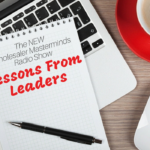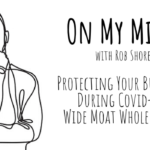Your long-tenured PM is leaving the firm.
The rider that advisors have been selling the heck out of is going away.
Your new business processing is delayed by 10 days.
All bad news – and all messages that are no fun to deliver.
Which is why Steven Gaffney is here to visit with us in this episode.
Steven is the global authority on teaching organizations to tell the truth and communicate more effectively – and not from a place of righteousness. He teaches honest communication because it is a better business strategy. His experience spans almost 20 years and his results are unmatched. His client list is staggering and includes a diverse range of leaders, including military officers and top executives of multinational corporations such as: Lockheed Martin, Marriott, BP, Citigroup, Allstate Insurance, American Cancer Society, NASA, U.S. Marine Corps, and Barrick Gold Corporation.
Steven has been a regular contributor to some of the most respected national television, radio, and print media outlets, and he is the author of six publications: “Just Be Honest”, “Honesty Works!”, “Honesty Sells“, and “Be A Change Champion: Mastering Momentum.” Steven Gaffney is also an esteemed member of the Million Dollar Speaking Group of the National Speakers Association. People across the globe credit his speaking engagements, seminars, television and radio appearances, books and multimedia products, with making immediate and lasting positive changes in both their organizations, as well as their personal lives.
Book Steven for your next event through Wholesaler Masterminds Speakers Bureau.
Editors note: Listen for Steven’s free book offer in the podcast!
The Truth About Trust: How to Build a Sustainable, Successful Business During Uncertain Times as a Wholesaler
We all know it is imperative in any business, especially in sales as a wholesaler, to build trust. In fact, I have found there is a direct correlation between the amount of trust and money. The more someone trusts you, the more likely they are to open up about their practice and their investment solution needs.
So the key question is how do we build trust with anyone? The answer is to understand how trust is truly built and what you can immediately do to build it. After working with thousands and thousands of people over the past twenty years, I have found the most important way to build trust is through honest communication. The problem is most people feel they are honest, but when we really look at it, they are not.
There was a study done years ago that reported 91% of people lie on a regular basis. I think the other 9% of the study lied. I say this because our reasons for being dishonest are not often because we want to be unethical. It is simply because we are afraid to speak the truth. We tend to believe if we really say what we are thinking, it will not go over well and could hurt our relationships. And the truth is, it can hurt us, but it is usually because we didn’t tell the full truth.
That’s why the biggest problem is not what people say. It’s really what they don’t say – the feeling where we think, “If only they had told us, we could have done a lot better job.” For example, we might think, “If the advisor had just told us they were over-weighted in a sector, or they were paralyzed by DOL concerns, we could have addressed the issue and provided a lot better solutions and service.”
When we really look at the three most important levels of honest communication, we can begin to address what to do to correct and enhance any relationship. As you read below, ask yourself these questions: What level of honesty are you, and how honest are people with you?
Level one of honesty is reactive honesty
This is where we wait to be asked, and if we properly ask someone, they tell us the truth. The problem is if the right question isn’t asked, then we don’t get the answer we need. Yet when we challenge someone, the rationale is “well you didn’t ask me that question.” When someone is selling us something and their rationale is, “the client never asked,” the client feels lied to and this breaks down trust. The solution is in the other two levels of honesty.
The second level of honesty is proactive honesty
This is where, without prompting, we and others proactively share what needs to be said. For instance, we might say, “Here are the regulations that need to be considered, that you may not be considering at this moment when looking at your investments.”
The third level of honesty is the gold standard, called foreshadowing honesty
This is proactively sharing our perspective, without waiting to be asked, and looking into the future to anticipate possible challenges. By doing this we proactively foreshadow what might happen and address said challenges. An example would be where we anticipate certain regulations and where the market will go, as well as maybe even the politics of the situation, and advise accordingly with regards to investments.
So, the 3 questions you want to ask yourself are:
- What level of honesty are you with your advisors and how can you enhance it?
- What level of honesty are your advisors with you and how do you improve it?
- What level of honesty is the organization you are a part of, and how do you grow it?
After all, if you are not receiving the right, honest communication, how can you deliver the right, honest communication? If you and/or your organization is challenged with this, send me an e-mail at steven@stevengaffney.com as to what the challenges are, note that you read this article, and I will provide you specific strategies to help.
Written by: Steven Gaffney


 Becoming an Influential Wholesaler with Bob Burg
Becoming an Influential Wholesaler with Bob Burg Lessons From Leaders #7: Interview with Kevin McGarry, National Sales Manager, Nationwide Mutual Funds
Lessons From Leaders #7: Interview with Kevin McGarry, National Sales Manager, Nationwide Mutual Funds The Impact of Change on Distribution and Wholesaling with Steven Miyao
The Impact of Change on Distribution and Wholesaling with Steven Miyao On My Mind: Protecting Your Business During Covid-19: Wide Moat Wholesaling
On My Mind: Protecting Your Business During Covid-19: Wide Moat Wholesaling Why Don’t Wholesalers Ask For More Referrals? Our interview with Bill Cates
Why Don’t Wholesalers Ask For More Referrals? Our interview with Bill Cates